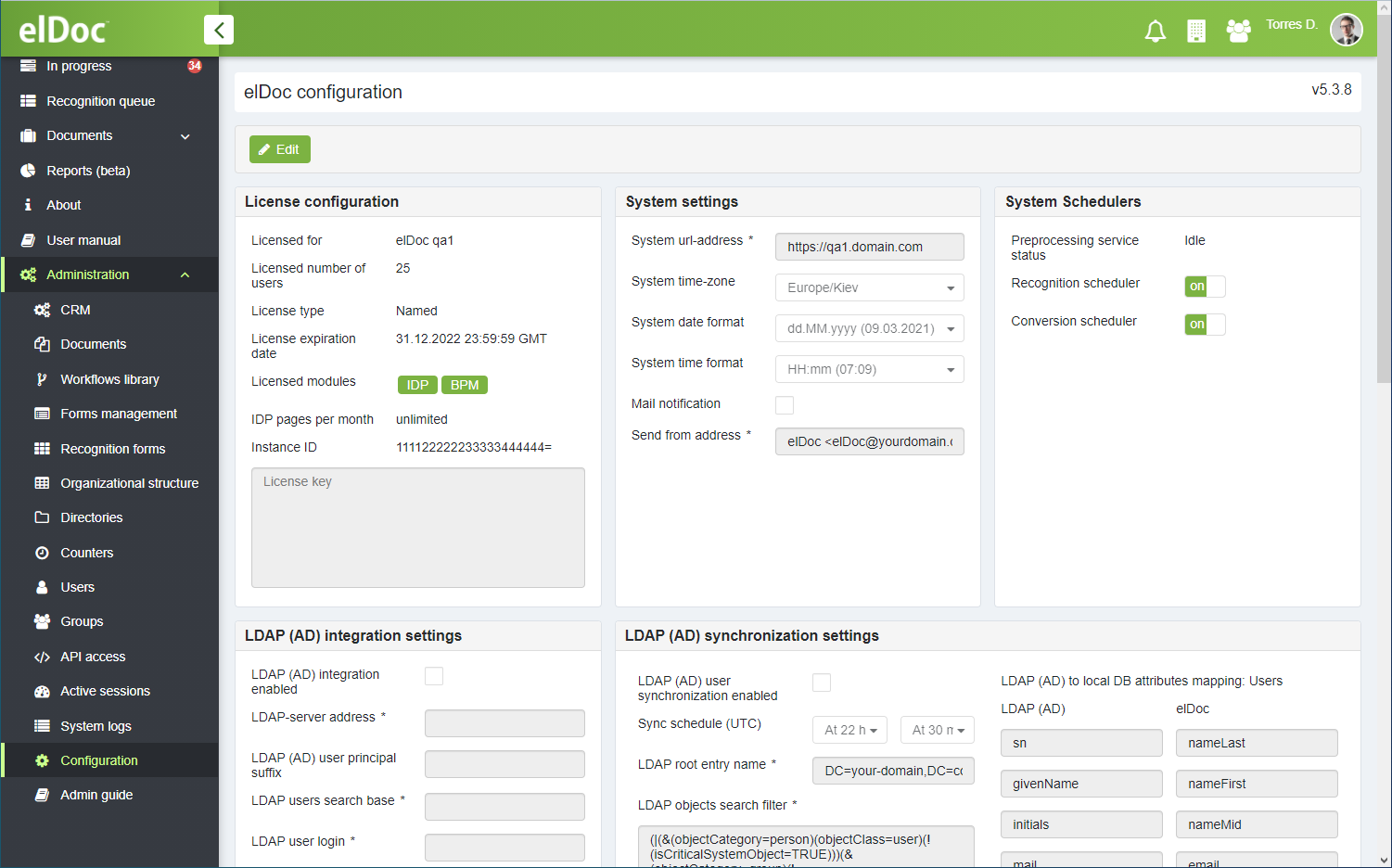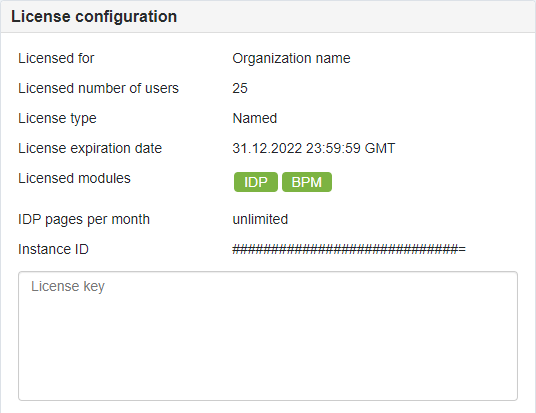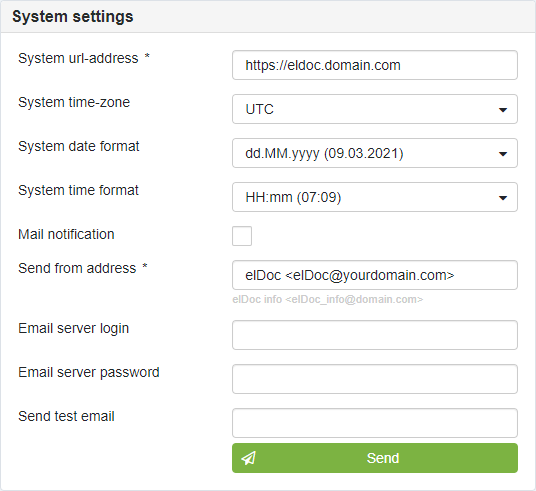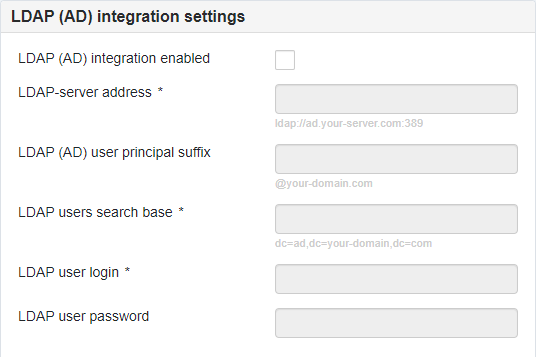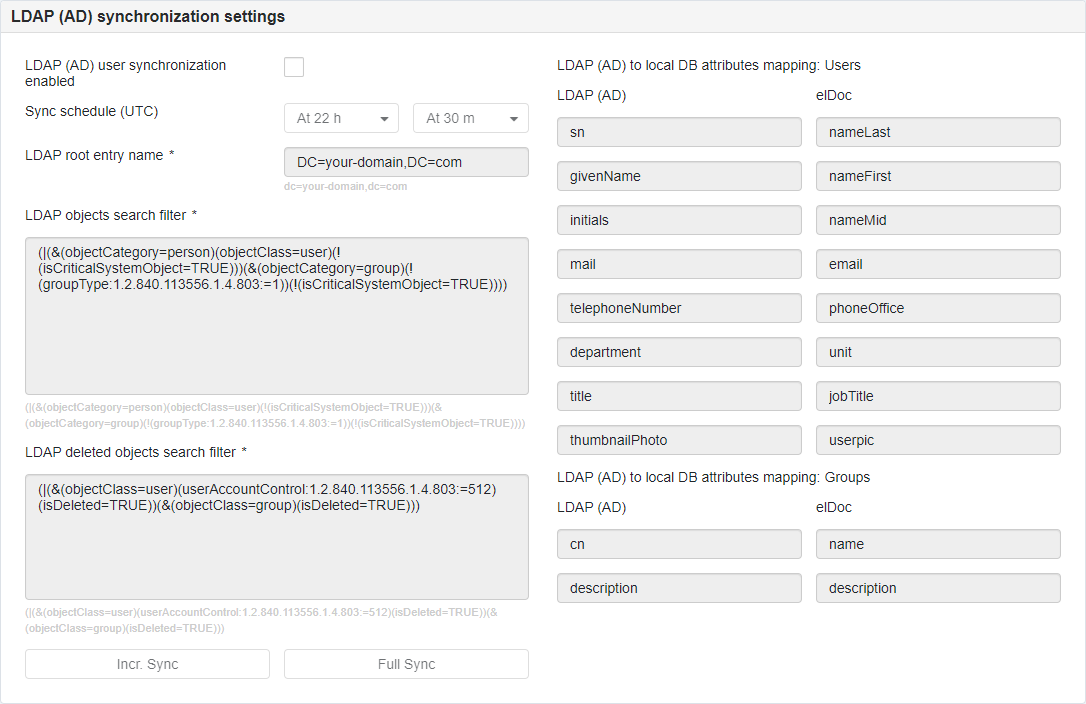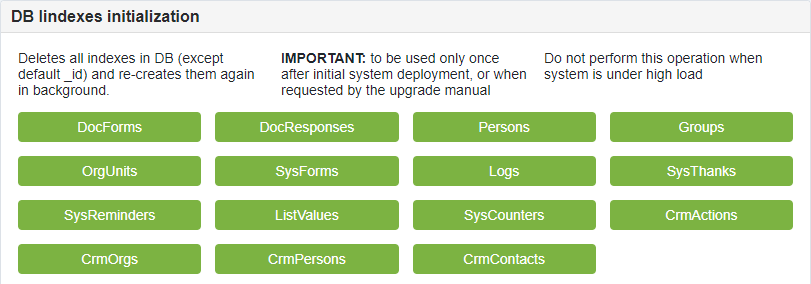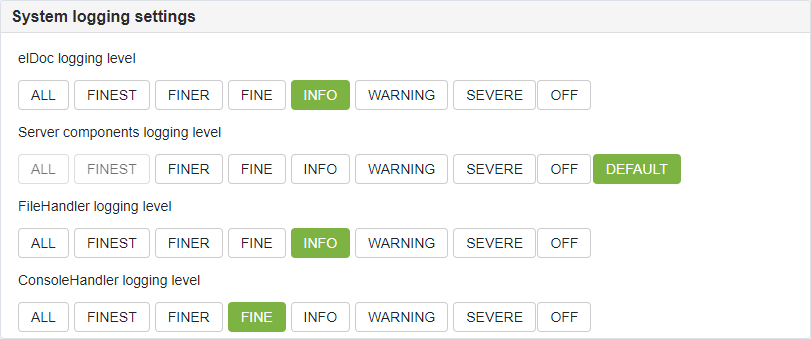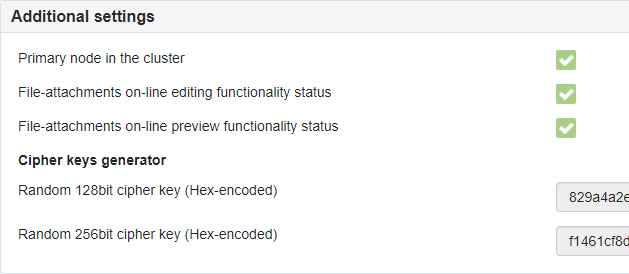System configuration
By pressing Administration → Configuration sub-menu you will be navigated to the elDoc Configuration page, which provides you with access to the system-wide settings.
Controls
- switches page into the edit mode (respective access-rights are required)
- saves settings (and validates LDAP credentials if any were provided)
- reloads system configuration defined in the eldoc.conf file
Sample page view
elDoc system configuration
License configuration
Provides information about currently installed license and allows to paste license code.
- Licensed for - displays the name of the organization to whom the license was issued to
- Licensed number of users - displays the number of users allowed to work with the system
- License type - displays the type of the license, can be "Named" or "Concurrent"
- License expiration date - displays the date when the license expires
- License modules - displays the licensed (available) modules, may include "IDP", "BPM" or both
- IDP pages per month - displays the licensed number of pages which can be processed by month* (month counted as last 30 days)
- Instance ID - instance code to which the license is attached to
Community license limitations
elDoc community license comes with the following limitations:
- Licensed number of users: 5 - community license comes with 5 Named users only
- IDP pages per month: 50 - community license comes with 50 IDP pages per month, the same limitation applies when IDP module is not licensed
- IDP forms limit: 3 - community license limits the number of Recognition Forms to 3, the same limitation applies when IDP module is not licensed
System settings
- System url-address - defines system base url address
- System time-zone - defines system-wide time-zone (can be overridden by end-users in their own profiles)
- System date format - defines system-wide date format (can be overridden by end-users in their own profiles)
- System time format - defines system-wide time format (can be overridden by end-users in their own profiles)
- Mail notifications - enables email-notifications
- Send from address - defines email address to send email notifications from
- Email server login - defines email server (SMTP) login (if required)
- Email server password - defines email server (SMTP) password (if required)
NOTE: SMTP transport parameters are to be defined via eldoc.conf file - Send test email - allows to enter email address to which test email can be sent
System schedulers
- Preprocessing service status - displays current status of the IDP Pre-Processing Queue by showing the documents which are currently being pre-processed
- Recognition scheduler - disables/enables recognition queue processing
- Conversion scheduler - disables/enables conversion queue processing
LDAP (AD) integration settings
Provides configuration options for setting up integration with the external LDAP-catalog (like AD) in order to perform users authentication.
NOTE: user profile should be present in the elDoc system in order to allow user to log in into the elDoc system using LDAP-credentials. For this LDAP synchronization is to be enabled.
- LDAP (AD) integration enabled - disables/enables LDAP integration.
- LDAP-server address - LDAP-server address (domain name or ip-address and port)
- LDAP (AD) user principal suffix - users suffix to be automatically added while login (for username@your-domain.com to be entered as @your-domain.com)
- LDAP users search base - LDAP search base where to perform user principal lookup
- LDAP user login - LDAP server login for the elDoc system to act of behalf of it (requires read-only access)
- LDAP user password - LDAP server password for the elDoc system
LDAP (AD) synchronization settings
Provides configuration options for setting up synchronization of LDAP user profiles with the elDoc system.
elDoc system performs incremental LDAP-synchronization by comparing Highest Committed USN with the one remembered from the previous incremental sync. Initial sync always performed as full sync.
- LDAP (AD) user synchronization enabled - enables/disables LDAP-synchronization
- Sync schedule (UTC) - defines synchronization schedule (UTC/GTM based)
- LDAP root entry name - defines LDAP root entry name
- LDAP objects search filter - defines LDAP objects search filter for locating user profiles and groups which are to be synced with elDoc internal directory
NOTE: Contact your LDAP administrator for receiving most optimized filter expression - LDAP deleted objects search filter - defines deleted LDAP objects filter for reflecting objects deletion in the elDoc internal directory
NOTE: Contact your LDAP administrator for receiving most optimized filter expression - LDAP (AD) to local DB attributes mapping: Users - defines attributes mapping between LDAP and elDoc directory for user-profiles
- LDAP (AD) to local DB attributes mapping: Groups - defines attributes mapping between LDAP and elDoc directory for group-profiles
HINT: in order to manage elDoc roles via LDAP (AD) - assign required roles in elDoc to the groups synchronized from LDAP (AD) and then just add/remove users to those groups via LDAP (AD) - Button: "Incr. Sync" - performs incremental sync once pressed
- Button: "Full Sync" - performs full sync once pressed
DB indexes initialization
Provides functionality for re-creating database indexes
System logging settings
Provides functionality for charging logging levels.
NOTE: It is highly recommended to keep logging levels as shown on the screenshot below for the production environments.
Additional settings
- Primary node in the cluster - indicates that the current node is the primary instance in the cluster
- File-attachments on-line editing functionality status - indicates on-line editing service status
- File-attachments on-line preview functionality status - indicates on-line preview service status
- Cipher keys generator: Random 128bit cipher key (Hex-encoded) - generates random cipher key (to be used for eldoc.conf)
- Cipher keys generator: Random 256bit cipher key (Hex-encoded) - generates random cipher key (to be used for eldoc.conf)
Last modified: April 28, 2023



